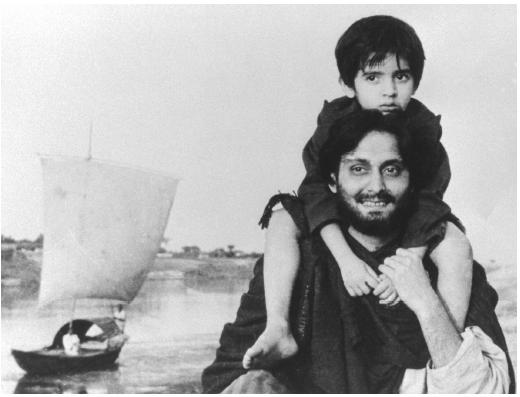 [Given above is a shot from the beginning of the film: Mrinmoyee looking out on the river, staring at Amulya, who is making his way towards the bank on a boat.]
[Given above is a shot from the beginning of the film: Mrinmoyee looking out on the river, staring at Amulya, who is making his way towards the bank on a boat.]A Ray shortfilm, and the final part of the 'Teen Kanya' series adapted from the short stories; Samapti startles one with it's simplistic portrayal of life, and the wide range of emotions the human mind can scale...
Amulya, played by the legendary Ray-favourite Soumitra Chatterjee, is a young man from a village who returns from the city to visit his mother, Jogmaya. Jogmaya wants Amulya to get wedded soon: since he is on a two-month vacation, and there is an auspicious date for a wedding just around the corner. She has already decided who she wants as a daughter-in-law, and inspite of Amulya's unwillingness to tie the knot so soon, she coaxes him to visit the girl's house once.
And so Amulya makes his way through ankle-deep mud towards the girl's house. All the while, he is followed by a carefree and whimsical young village girl named Mrinmoyee (played by a very young Aparna Sen), who likes roaming with the village-children, swinging all day long, catching and playing with squirrels, climbing up trees and so on (and hence, she has earned the moniker: "Puglee"). Mrinmoyee is amused to see a well-dressed babu like Amulya finding it difficult to make his way through the mud. Amulya is received warmly by Kishori, the prospective bride's father (played brilliantly by my personal favourite, Santosh Dutta), who amuses the spectator quite a lot with his mannerisms-- especially, the 'he-he-he' smile that accompanies each line Kishori speaks! The visisbly shy and uncomfortable Amulya has to sit before an excessivley coy girl who can't articulate what to speak; and all the while Mrinmoyee stands an amused witness to the comic situation of sorts.. Just to make matters even funnier, Puglee launches her pet squirrel Chorki at the coy bride-to-be. What follows is a comedy of errors!
To cut the long story short now, Mrinmoyee's numerous pranks on Amulya convinces the young man that none but Puglee must be his bride. Ah! of course, Amulya's mother is devastated that her whimsical son has finally decided to marry a tomboyish girl who isn't modest in the least, and moreover considered by all and sundry as a freak. Finally though, she somehow warms up to her son's wishes. Meanwhile, Mrinmoyee can't stand the thought that she has to leave all her little friends, Chorki, the trees and playfields of the the village to become a housewife; and in a vain attempt to stop the marriage she chops her hair off. On the wedding night, a very patient Amulya explains how he'd like his new wife to be, and that he won't force her to do everything, but that doesn't stop the carefree Mrinmoyee to escape Amulya's house. She visits her little squirrel Chorki, and the swing by the river which she so loves. In the soft caressing love of Mother Nature, she falls blissfully asleep. Meanwhile, there's mayhem in Amulya's home as everyone discovers that Mrinmoyee has fled in the shadows of the night. They find her back and Jogmaya locks her up in a fit of rage. Inspite of his mother, Amulya frees his wife and says that he will leave her back at her father's house and leave for the city. If ever Mrinmoyee wants Amulya back in his life, she must only write him a letter. To show his love for the carefree girl, Amulya also says how he'll be happy if Mrinmoyee addresses him as "tumi" rather than "aapni".
Quite unexpectedly, Mrinmoyee loses the strong affinity she had for her little friends, Chorki, and Mother Nature and willingly resigns herself to a fast. Jogmaya is worried she won't see her son again, and hence on the advice of one of her friends, she writes to her son about an imaginary illness she's suffering from . Amulya returns to find out the truth, and obeying his mother's request to enquire about Mrinmoyee, he visits her father's house. But Mrinmoyee escapes in the meanwhile-- disappointed to learn that Amulya has returned not for her but for his own mother. On a stormy day, Amulya searches for Mrinmoyee all day long and returns disappointed. But just as he enters his room, he finds a note from Mrinmoyee saying "tumi fire esho". And the biggest surprise is that: Mrinmoyee is back, the same way she'd disappeared on the night of her wedding!
Samapti scales an amazing portion of the whole range of human emotions and psyche: love of nature, and love between humans. Again, a masterpiece from the master: Satyajit Ray.
Anyway, Christmas wishes to all my blog-readers, if any!! :)
P.S.-- My friend Sayantani has written a superb comment on my short review-of-sorts. I'd like the reader to go through it too!


